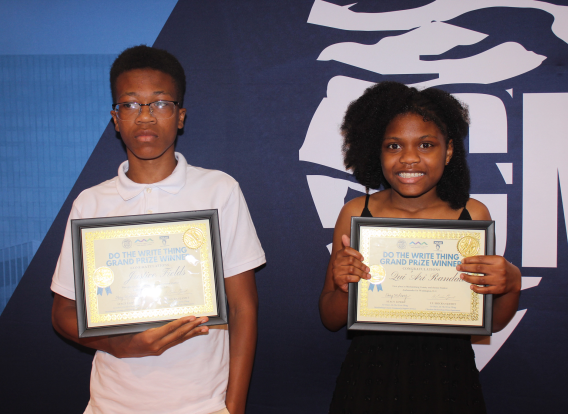Do the Write Thing: Students Share Powerful Experiences With Youth Violence
Two students have been named National Ambassadors of Mecklenburg County’s annual “Do the Write Thing” writing contest and may represent their peers during the National Campaign to Stop Violence Recognition Week in Washington, D.C. this summer. The local recognition ceremony was held May 6 at the Charlotte Police and Fire Training Academy, where Justice Fields of Whitewater Middle School and Qui’arie Randall of Northeast Middle School were named co-ambassadors.
Justice Fields, Whitewater Middle School, and Qui’arie Randall, Northeast Middle School
An initiative of the National Campaign to Stop Violence, Do the Write Thing is a writing program for middle school students that engages students to think about how youth violence has affected their lives and to consider what they can do about it. As National Ambassadors of Mecklenburg County, Qui’arie and Justice, a parent or guardian, and a teacher are invited to Washington for an all-expenses-paid trip in July. They will see their works placed in the Library of Congress, visit national landmarks, learn more about the nation’s capital, and attend the national Do the Write Thing recognition dinner.
Do the Write Thing is a partnership between Mecklenburg County Community Support Services’ Prevention and Intervention Services division and the Charlotte-Mecklenburg Police Department. The program is targeted to middle school students because they are old enough to have experience that is shaping their lives, yet not too old to be stuck in detrimental patterns. At a very vulnerable age, just when they are becoming teens, Mecklenburg County hopes to connect with them, advancing a commitment to valuing their words.
Qui’Arie Randall wrote of the pain and the impact of youth violence on her life, and how she took those feelings out on the people she loves.
I think the main cause of youth violence is that the perpetrator is typically someone who has been hurt before. It’s a cycle—hurt people hurting others to gain attention and a sense of power because of their feelings of exclusion and powerlessness … But I’ve decided that if I’m part of the solution, it can be something that happens less, and if I’m around, not at all.
Students from 30 Charlotte-Mecklenburg Schools submitted 933 essays this year. For the writing challenge, students may use any form of written expression, such as essays, poems, plays, or songs, with most entries approximately 500 to 1,000 words in length. The most common types of violence addressed by the students this year included bullying and cyberbullying, physical assaults and school fights, and gun violence.
For many students, it is the first time that they have expressed themselves about how violence affects them. Writing becomes a cathartic and therapeutic experience. They take a very personal and sometimes painful experience, put it on paper, and move forward. No one likes to be marginalized. These young students have experiences, thoughts, and insights that they want to share.
Justice Fields submitted an essay that described the violent death of a 15-year-old cheerleader at the hands of another cheerleader and its impact on his family and community.
Kayla’s death could have been avoided if the adults present at the fight intervened … I can help prevent youth violence by raising awareness of youth violence by being a positive role model and lead by example. I can show people how to have peaceful conflict resolution by communicating to each other. I can practice showing more empathy towards others. I can encourage my peers to be respectful and use social media more responsibly. I can also ask my peers not to use social media as a weapon or to bully people.
Partners in Do the Write Thing include Communities in Schools, Charlotte-Mecklenburg Police Department, Charlotte-Mecklenburg Schools, and Right Moves for Youth.
Photos from this year’s ceremony can be viewed here.


